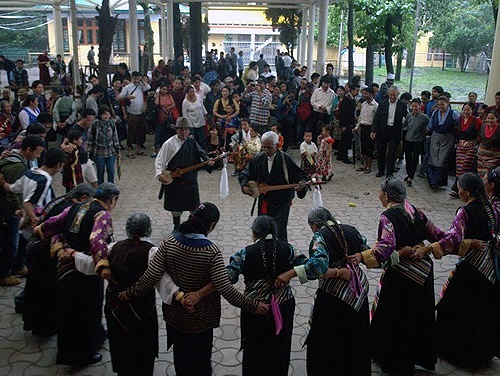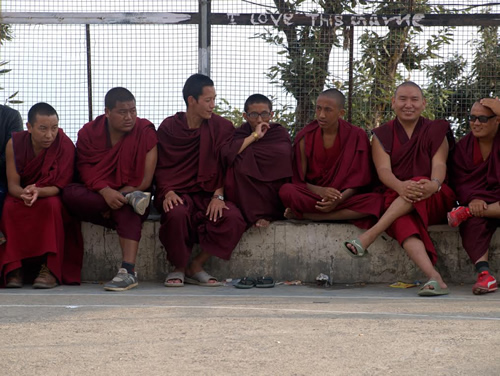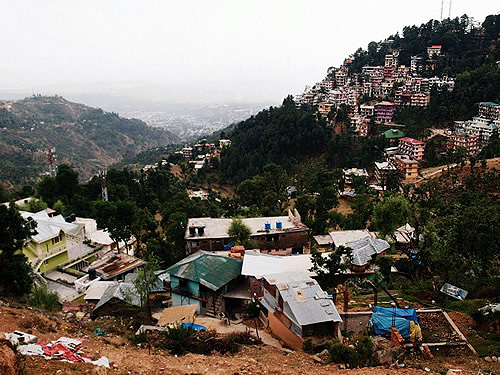Living, Learning, and Volunteering in Dharamsala, India
Among Exiles
Article and photos by David Joshua Jennings
10/2013
 |
| Tibetan exiles performing a traditional dance during the Dalai Lama's birthday in Mcleod Ganj, India. |
Perched atop the green hills that rise above Dharamsala valley sits the surprisingly busy village of Mcleod Ganj, home to the Tibetan government in exile and the residence of His Holiness the 14th Dalai Lama. Flanked by the snow-capped Himalaya mountains and filled with countless courses and activities at a minuscule price, the little town has also attracted a significant population of expatriate volunteers and students of Buddhist philosophy.
Like the other popular traveler hangout in India’s Himachal Pradesh state — Manali — Mcleod Ganj is well prepared to receive the thousands of backpackers and tourists that come for the spiritual ambiance, to help Tibetans refugees or to simply escape the heat and chaos of the low-lands and spend a few days relaxing in the cool mountain air.
Tibetan Exiles
Tibet was an autonomous kingdom ruled by the spiritual dynasty of the Dalai Lama until 1949, when the Chinese People’s Liberation Army invaded the country with the aim of peacefully liberating it. Since then, more than 250,000 Tibetans have fled on foot over the Himalaya seeking asylum in India.
The Dalai Lama fled Tibet and was granted asylum in Dharamsala in 1959. The headquarters of the Tibetan government in exile is located in the village of Gangchen Kyishong, a short walk below Mcleod Ganj, where a team of politicians continues to fight for the rights of those still being oppressed in Tibet.
Volunteers seeking to help Tibetans in Mcleod Ganj may assist with these efforts directly or indirectly by serving the exile community through educational and other means.
There are also opportunities to meet the Dalai Lama face-to-face during your stay in Mcleod Ganj, but private audiences are rarely granted. To find out the Dalai Lama’s teaching schedule in Dharamsala and elsewhere, as well as just about everything else you may wish to know about him, check out www.dalailama.com.
Why Mcleod Ganj?
Besides the obvious attraction of living in a relatively serene mountain village up the road from the Dalai Lama, Mcleod Ganj is really unlike anywhere else in India. Often referred to as “Little Lhasa,” much of the population is made up of Tibetan refugees, with the rest consisting of local Indians and an impressive array of travelers from around the world, mostly students of Buddhism.
Another attraction, at least for travelers and volunteers, is the cost. In Mcleod Ganj, you can live comfortably on as little as $150 a month, including lodging and meals, and with a budget of $200-300 you will experience relative luxury.
 |
| Tibetan monks relaxing and watching a basketball game. |
There are also plenty of things to see around the area, including a few waterfalls and a network of trails leading to the nearby Dhauladhar range and to a number of remote villages, monasteries, and temples. Within the town there are museums related to Tibetan culture and history, plenty of places to hear live music most nights, and the Tsuglagkhang Complex, the largest Tibetan temple outside Tibet, which has a large meditation hall containing some beautiful statues and thangkas, where you can meditate while listening to monks chanting from 6-8 a.m. and watch monks debate between 4 -7 p.m. The Tsuglagkhang is the monastery of the Dalai Lama and is located just in front of his residence.
Volunteer Opportunities
Mcleod Ganj is the volunteer capital of Himachal Pradesh. It’s fairly simple to sign yourself up for a short-term (less than two months) commitment teaching English conversation classes to newly arrived Tibetan refugees or cleaning up the litter that environmentally-unconscious domestic tourists throw all over the roads during the weekends. If you have a special skill, particularly technology or computer-related, there are many short-term projects or training opportunities available.
 |
|
View of Mcleod Ganj, India.
|
For a long-term placement (2-3 months or more), however, there are a number of organizations that can help find a suitable position to match your existing skills. There is a good chance you will work through the Tibetan Government-In-Exile office, an official NGO, or with one of the larger Tibetan organizations. Compared to the short-term opportunities, the long-term placements are usually more important positions and require a full-time commitment, with volunteers expected to work 9-5 Monday-Friday and every other Saturday. Most of the organizations are not able to provide compensation for these positions. Some, however, do offer free room and board for special situations. A number of these opportunities are advertised in the locally published Contact Magazine.
Other Options in Dharamsala
LHA Charitable True
Arranges positions at a variety of local community projects, including positions as computer teachers and English- and French-language teachers. A commitment of one month or more is required for serious vocational programs. Also offers private, one-on-one Tibetan-language classes for Rs100 per hour.
Tibet Charity
A place to donate a few days of your time to share your life story with refugees, helping improve their conversational English.
Gu-Chu-Sum
Established in 1991, Gu-Chu-Sum provides support to ex-political prisoners and their families and organizes campaigns for their release.
Location: Jogiwara Road.
Aku Pema Performance Art
Established in 2000, Aku Pema Performance Art group aims to preserve traditional Tibetan art and culture. International visitors and volunteers are welcome to contribute and enjoy the cultural programs. They seek volunteers able to teach: group music and singing, English language (any level and age), and dancing (any style).
Location: Norbulingka Institute
Organizations such as the Tibetan Welfare Office, the Tibetan Library, the Tibetan Women’s Association, the Tibet Institute of Performing Arts, Tibet Museum, the Institute of Buddhist Dialectics, various monasteries and nunneries, and offices of the Government-in-Exile also frequently offer volunteer opportunities.
Classes Available
Yoga
Mcleod Ganj is home to countless yoga schools, offering Hatha, Ashtanga, and Kundalini yoga classes through daily drop-in sessions, as well as week-long intensive courses and teacher training courses that last a month or more. Classes, which cost Rs100 per session, are held in the morning, afternoon and evening at the following schools:
Universal Yoga (Highly recommended), with international classes and locations.
Location: Yongling School, Jogibara Road.
Himalayan Iyengar Yoga Center.
Location: Dharamkot Road.
Yogi Cottage (Yoga alliance approved, also offer reiki courses).
Location: Bhagsu Road.
Kundalini Yoga. Location: Thardoeling, Near HH Dalai Lama temple.
Kailash School of Yoga & Holistic Healing. Location: 100 meters from main chowk.
Meditation & Buddhist Philosophy
Courses
Tushita Meditation Centre
Tushita offers 10-day Introduction to Buddhism/meditation retreats, 8-day non-residential courses, and programs for advanced students, all in the Tibetan Mahayana tradition. Silence is the norm most of the day, but discussion groups do take place after philosophy lessons. The price of around Rs500 per day includes lodging, lessons, and three vegetarian meals a day.
Location: On the road between Dharamkot and Mcleod Ganj.
Vipassana Meditation Center
This center, located in nearby Dharamkot, runs austere 10-day vipassana (mindfulness) meditation retreats, during which you must remain completely silent. The retreats, which run from May to November, are intense (up to 14 hour days), but no previous meditation experience is required, as you will be asked to set aside any practice while learning the vipassana technique. It is recommended that beginners attend a course like those offered by Tushita — a mix of meditation, philosophy, and discussions. The retreat is free, but donations are welcome.
Library of Tibetan Works and Archives
Located inside the government compound at Gangchen Kyishong downhill from Mcleod Ganj, this library hosts a number of Buddhist philosophy courses throughout the year. Most teaching is in Tibetan with an English interpreter. Most courses last from two to three months and cost Rs200, in addition to the Rs50 registration fee. The library also runs long-term Tibetan- and Hindi-language courses for beginners and advanced students for Rs250 per month plus a Rs50 registration fee.
Language
Besides the Library of Tibetan Works and Archives, mentioned above, there are a number of independent Tibetan- and Hindi-language teachers about town. Teachers post signs everywhere, but to get a good idea of what is available before you come it is best to check Contact magazine (www.contactmag.org) for details. Other options include:
Tibetan Buddhism and language
The organization offers courses in Tibetan Buddhism, as well as Tibetan- and Hindi-language classes.
Cooking Classes
Mcleod Ganj is a great place to learn how to cook authentic Indian and Tibetan cuisine. Classes cover everything from Tofu Thukpa to South Indian Masala Dosas. Prices run about Rs250-500 per class, which usually last two hours. There are a number of entrepreneurs who run courses of dubious quality out of their homes, so it is best to be circumspect and stick with one of the following established kitchens:
Lha Charitable Trust
Offers courses on how to make different kinds of momos, Tibetan breads, and Tibetan noodles. Rs300 for a 2-hour class.
Location: Temple Road.
Lhamo's Kitchen
The organization teaches traditional Tibetan vegetarian food with different courses every day, including soups, momos, and
Tibetan bread. It all takes place in Lhamo's single room
house right in the center of town. Classes Rs250, 3-day courses
Rs550.
Location: Bhagsu Road.
Mr Sangye's Kitchen
Tibetan food, with different courses every day.
Location: Joqibara Road, next to Tashi Choeling Monastery. Classes Rs250.
Other Courses
The above list really just scrapes the surface of the courses on offer in Mcleod Ganj. A brisk stroll down Jogibara Road will also reveal classes on Tantra, Reiki, Tai Chi, swing dancing, woodcarving, painting, sound meditation, rebirthing, and a host of other New Age-oriented learning opportunities. Alternatively, if you are not into this type of spiritual experience, you could learn how to play the flute, guitar, or sitar, or take 5-day courses on traditional Thai, Tibetan or Ayurvedic massage, which run around Rs1800. Massage schools include Tibetan Universal Massage (Jogibara Road) and Massage Mantra (Jogibara Road).
|
David Joshua Jennings is a writer and
photographer from Oklahoma, USA. You can find him at davidjoshuajennings.com.
|
